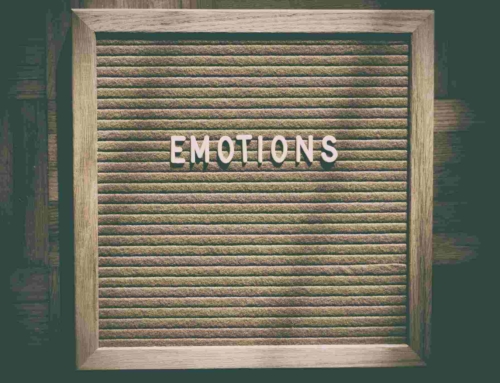 If you’ve ever found yourself feeling like you’re at a breaking point emotionally, you’ve experienced emotional exhaustion. Emotional exhaustion shows up not only in how you’re feeling emotionally but also physically and in negative impacts on your ability to perform at work and be present at home.
If you’ve ever found yourself feeling like you’re at a breaking point emotionally, you’ve experienced emotional exhaustion. Emotional exhaustion shows up not only in how you’re feeling emotionally but also physically and in negative impacts on your ability to perform at work and be present at home.
When emotional exhaustion sets in, you may find that you have less patience to engage with family and friends at the end of your workday, and you are more easily frustrated with them. Emotional exhaustion doesn’t happen overnight unless you’re under intense stress. For most people, emotional exhaustion builds up slowly over time, and that means that by paying careful attention to your levels of emotional energy, you can keep emotional exhaustion at bay.
What is Emotional Exhaustion?
Emotional exhaustion is the state of feeling emotionally worn-out, drained, or tired because of the build-up of stress from work or your personal life, or a combination of the two. When you feel emotionally exhausted, you may feel like you’re trapped in your circumstances, and it can generate a whole host of symptoms such as physical fatigue, hopelessness, irritability, irrational anger, feeling listless and unmotivated, absentmindedness, trouble sleeping, changes in appetite, pessimism, depression, and a sense of dread.
Emotional exhaustion can happen to anyone, but some people are more at risk for it than others. Those who have demanding jobs such as educators, caregivers, police officers, or people in healthcare often live with long-term stress and are at great risk of emotional exhaustion.
Others who are at risk of emotional exhaustion are those who don’t prioritize self-care, people who are lonely and don’t have many significant social connections, and those who struggle with perfectionism. Emotional exhaustion can also set in if you use harmful coping strategies to deal with stress, or if your work situation generates a lot of stress and yields low job satisfaction.
Emotional Exhaustion and Burnout
There is a close connection between emotional exhaustion and burnout. In fact, one might say emotional exhaustion lies at the heart of burnout and is one of the key symptoms of burnout.
The term “burnout” came into use in the 1970s to describe the effects of severe stress on professionals such as doctors and nurses. You have finite emotional resources. As these are used up, you may try to cope with stressful situations such as work demands and conflict. But your sense of well-being and capacity to replenish your energy reserves diminishes and you become less and less able to care for yourself and others.
Emotional exhaustion, which is a key sign of burnout, often leaves a person feeling even more stressed and cynical about their work and relationships. The result is often declining work productivity, missed deadlines, and unfulfilling personal relationships.
 Prevention Steps
Prevention Steps
To prevent emotional exhaustion, it may be helpful to understand the causes that lie behind it.
The main cause of emotional exhaustion is chronic stress from work or in one’s personal relationships. Each person has different reserves of emotional energy. What triggers emotional exhaustion will differ because stressful situations and the capacity to cope with these differ from person to person. Some of the triggers of emotional exhaustion include high-pressure jobs as mentioned before, but they also include the following:
- working too many hours or working at a job you don’t enjoy
- having a child
- raising children
- financial stress or poverty
- feeling a lack of control over your life and feeling overwhelmed as a result
- grief after losing a loved one
- experiencing homelessness
- relationship struggles and conflict, including situations such as prolonged divorce proceedings
- being a caregiver for a loved one and sacrificing your needs as a result
- living with a chronic illness or injury
- poor emotional regulation and responses to a situation
- a lack of social support
You can begin to manage stress and stave off emotional exhaustion by regulating your emotions through techniques such as recognizing and acknowledging your feelings and reappraising experiences you find stressful. By stepping outside your perspective and considering the larger context of your situation, you can avoid taking upheavals and difficulties in life too personally.
This will help you reframe your experiences as both manageable and common to everyone. Additionally, you can try and find ways to reconnect with your core values so that as you reengage with tough situations at work and at home, you meet them with a renewed sense of who you are and what matters to you.
When you’re in the thick of it, a change in mindset or attitude goes a long way. The cumulative stresses and strains of life can pile up and make any situation seem hopeless. This can add to your stress and quickly lead to emotional exhaustion.
You can change your mindset and prevent emotional exhaustion by avoiding comparing yourself to others, practicing gratitude and focusing on the positives, staying in the present and not dwelling on the past or stressing about the future, and also simply accepting negative feelings as part of life and not fighting them. These small changes can improve your emotional well-being.
What to Do When Emotional Exhaustion Sets In
 In some situations, try as you might, emotional exhaustion can set in. What can you do if this happens to you?
In some situations, try as you might, emotional exhaustion can set in. What can you do if this happens to you?
One of the most important things you can do to deal with emotional exhaustion is to reduce your emotional drain by removing the stressor that’s contributing to emotional exhaustion. If your work environment is the primary cause of your emotional exhaustion, you can consider transferring to another department, changing jobs, or finding another outfit for which to work.
If the main stressor is your superior, you can request to be transferred and work under a different manager or join another team. It isn’t always possible to remove the stressor at work or in your relationships. In the situation where you can’t eliminate the stressor altogether, you can direct your efforts toward minimizing its impact on you. Some of the steps that you can take to replenish your emotional reserves include:
1. Eating healthy.
The importance of good nutrition cannot be overemphasized. Avoiding eating sugary and fried foods, carbs such as white flour and white rice, trans fats, and caffeine. This can help you feel less lethargic.
Choose to drink lots of water, eat leafy greens such as Brussel sprouts, kale, and spinach, as well as foods rich in Omega-3 fats such as anchovies and salmon, fresh fruit, and nuts. Not only will switching up your diet help you get the nutrients you need, but it will also improve your sleep, digestion, and energy levels.
2. Finding social connections and sources of hope.
Face-to-face interactions with a loved one are a great way to relieve stress. They don’t have to fix your issues, but just by listening they can help you to feel like you’re not alone and have support. In the work setting, you can check if your employer has counseling services available for employees.
The world of work can be lonely, and even if you have colleagues with whom you enjoy working, you might all be feeling stressed because of being in the same work environment.
Stress can make you myopic, so you might lose sight of hope and not see all the options available to you. If you have people that are part of your network but not at the same workplace, connect with them, gather information, feel part of a larger professional community, and perhaps that might alert you to your value and the options that are out there. This can serve as a source of hope for you.
3. Exercising.
The word exercise doesn’t necessarily imply activity that leaves you drenched in sweat and sore for days. Do whatever works to elevate your heart rate for a few minutes a day, like a long walk, bicycle ride, swimming, jogging, or dancing. Any sort of physical activity not only helps by taking your mind off life and your stresses for a little while, but it also increases your endorphin and serotonin levels, which elevates your mood.
 4. Getting good sleep.
4. Getting good sleep.
Sleep is very important for mental health. It’s one way for your body to deal with the stress of the day and get you ready for the next day. Have a consistent sleep schedule and a bedtime routine that allows you to relax before bed and prepare for sleep.
This may include starting to wind down at a set time, switching your electronic devices off, doing a stretch, reading the Bible and praying, journaling, and making sure that the room is quiet, cool, and dark enough to sleep comfortably.
5. Taking a break.
We aren’t machines, so it’s wise for you to take a break every so often, whether during the day, over the weekend, or as a vacation at the end of a long year. Every little bit of rest helps, and you can make it count. You can practice mindfulness in your office space or at work if you can find a small gap. Focusing on the present and on small positive events can give you perspective and help your brain feel like things are in hand and not out of control.
These various practices can be helpful to reduce stress and rein in emotional exhaustion. However, moments of stress and anxiety will come, but you can face them with greater resilience and resistance to emotional exhaustion.
Getting help
Emotional exhaustion is an all too real experience for many people. The good news is that it is treatable, whether by eliminating the stressor that triggered it, or by using the other means addressed in this article. Other resources that you can make use of to cope with emotional exhaustion include your primary health care provider or mental health professional.
A mental health professional such as a counselor can help you explore ways to address emotional exhaustion as well as manage stress and anxiety. Sometimes all you need are some tools that will help you work through a stressful season, whether that’s relaxation techniques or talk therapy. A listening ear and support from a counselor can help you replenish your energy and continue meeting your obligations at work and at home.
There may be situations where medication may need to be prescribed to address the symptoms of emotional exhaustion. These include prescription sleeping aids, anti-anxiety medications, or antidepressants such as Selective Serotonin Reuptake Inhibitors (SSRIs).
If you’re facing a lot of stress and emotional exhaustion has set in or is on the horizon, consider seeing a counselor to get help with reducing stress and replenishing your emotional reserves. It’s the best move you can make for yourself, your loved ones, and others around you.
“Rain Drops on Water”, Courtesy of moments, Unsplash.com, CC0 License; “Mountaintop”, Courtesy of Pascal Debrunner, Unsplash.com, CC0 License;”wheat”, Courtesy of Wolfgang Hasselmann, Unsplash.com, CC0 License; “Roses”, Courtesy of Diana Serbichenko, Unsplash.com, CC0 License









